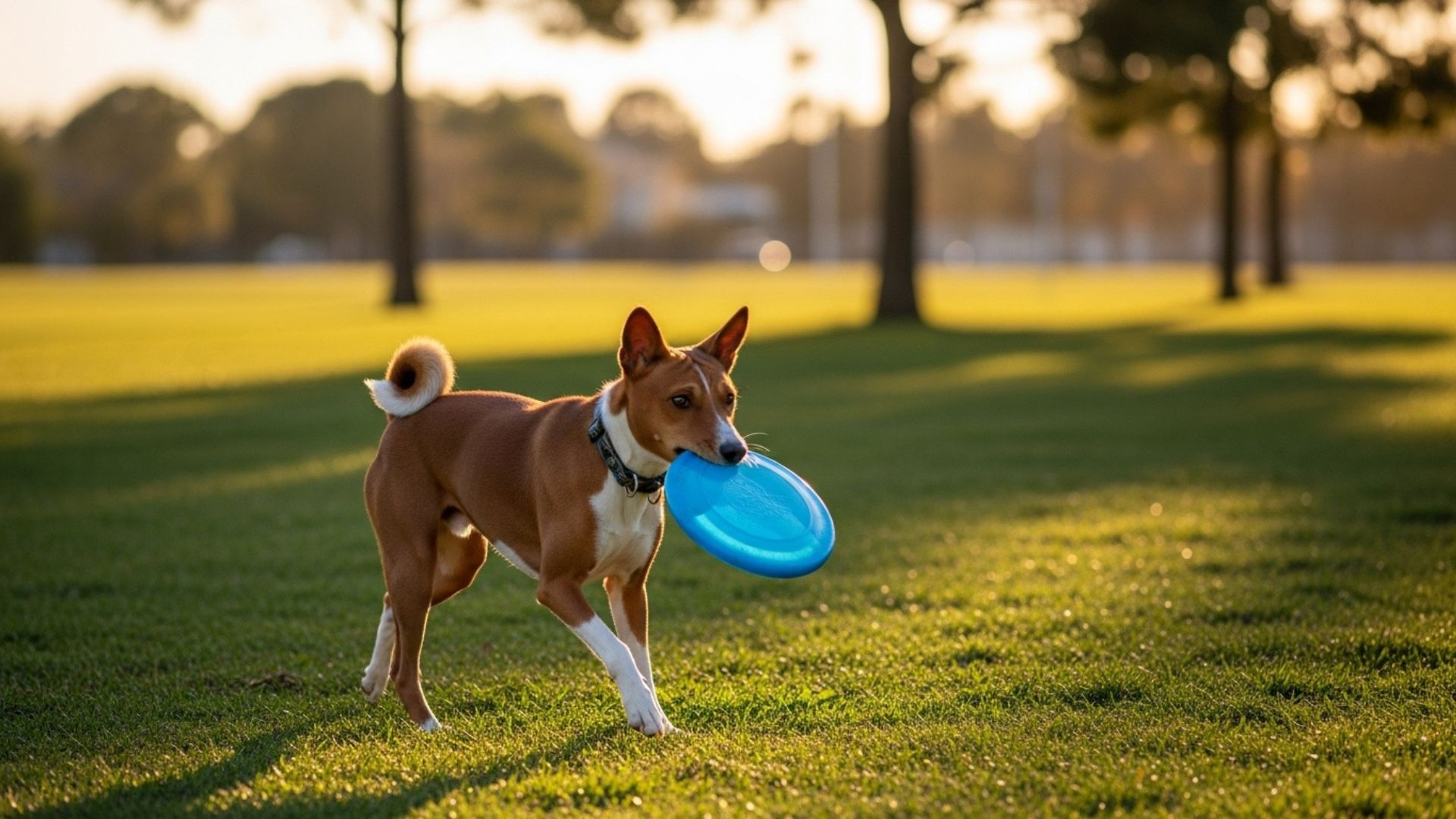Ever feel like your dog has to be your shadow 24/7? While some pups are basically furry little Velcro strips, others are more like, “You good? Cool—I’ll be over here doing my own thing.”
Just like people, dogs fall on a spectrum of clinginess, and while many adore constant companionship, others genuinely enjoy a bit of solo time.
If you’re someone with a busy lifestyle, a 9-to-5 grind, or just prefer a little personal space (no judgment!), the good news is—some dogs totally get it. They’re the introverts of the canine world: affectionate but not overly needy, loving but not in your lap while you work.
And while no dog should be left alone all day, some breeds are more naturally suited to low-maintenance living and can handle being alone for reasonable stretches of time—with the right toys, a cozy setup, and of course, regular exercise and love when you’re home.
In fact, an estimated 14–20% of all dogs may suffer from separation anxiety. That means choosing a naturally independent dog isn’t just a lifestyle choice—it can be a proactive way to support your pup’s emotional well-being, too.
So, if you’re looking for a dog who’s happy to do their own thing while you do yours, you’re in the right place. Let’s explore the breeds that truly embrace the solo-play lifestyle.
Key Takeaways
Tired of clingy, shadow-like dogs? This guide spotlights breeds that actually enjoy alone time and won’t follow you into every room.
Discover 7 independent dog breeds that are playful, loyal, and low-maintenance—perfect for people with jobs, lives, and limited downtime.
Learn which dogs can entertain themselves, adjust well to solo stretches, and still show affection (just not in the Velcro-dog way).
Whether you want a low-energy companion or a big personality with space-loving vibes, this list helps you find a pup that fits your lifestyle—not the other way around.
Independent Dog Breeds That Prefer Playing Solo
1. Shiba Inu
The Shiba Inu is a small, ancient Japanese breed known for its bold personality and striking appearance. Often described as “cat-like,” this dog is independent, alert, and naturally clean. They’re known to be loyal to their families, often forming a strong bond with their human companion.
Naturally Independent
Shibas are highly self-sufficient and don’t demand constant attention. This makes them a good fit for people with busy lifestyles. They do well alone after getting enough exercise—around 45 minutes a day is ideal.
Mental stimulation can keep them content while you’re away. Their independence also means they’re less prone to separation anxiety compared to many other breeds.
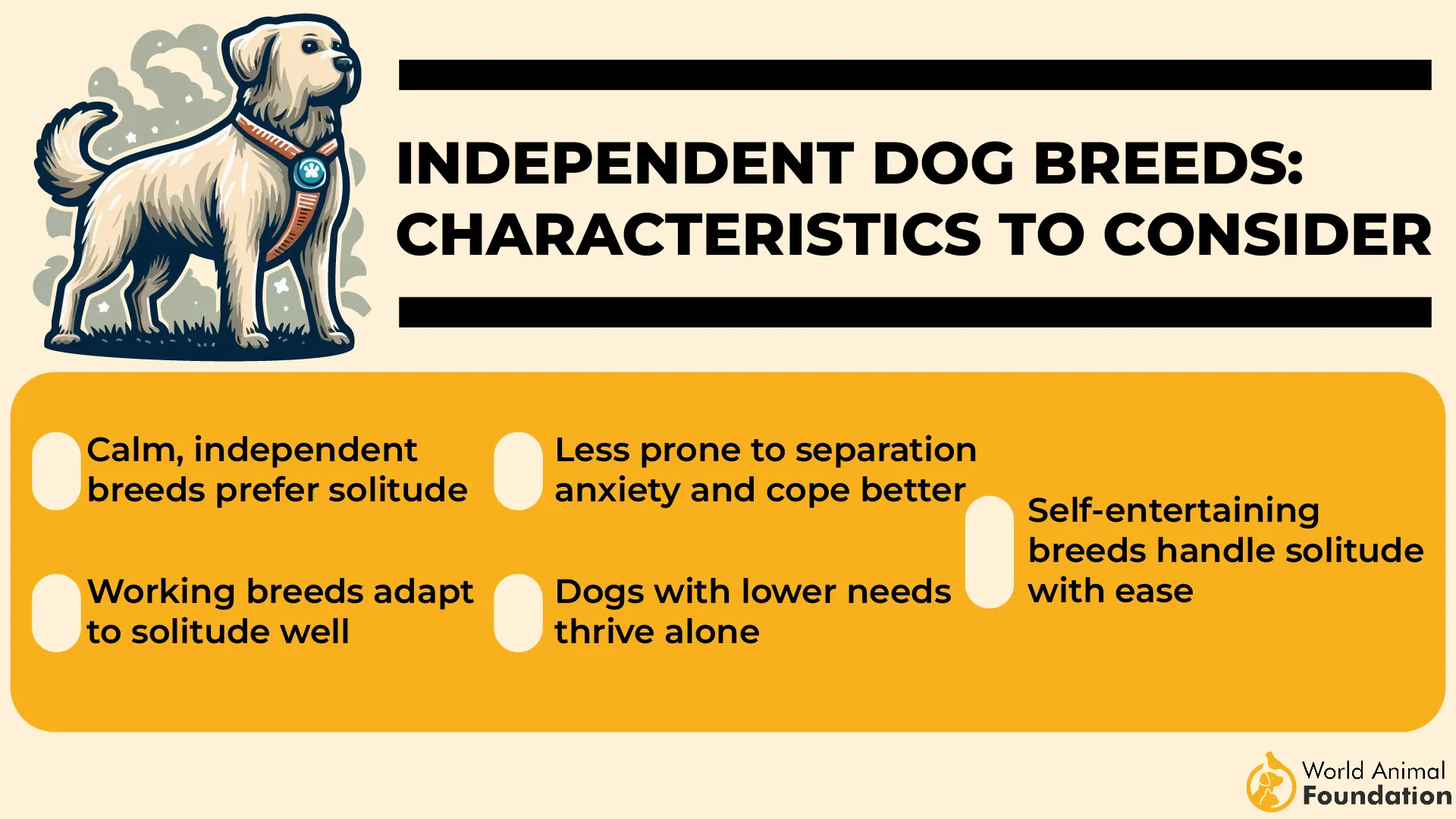
Big Personality, Small Package
Though independent, Shibas are not emotionless. They’re expressive and known for the “Shiba scream”—a loud, high-pitched sound used when they’re excited, scared, or unhappy. They were bred to hunt large game, so it means they have a strong prey drive.
They should always be leashed outdoors. While they’re affectionate with their families, Shibas can be aloof with strangers and may not always get along with other pets unless socialized early.
2. Chow Chow
The Chow Chow is an ancient Chinese breed known for its lion-like mane, dignified stance, and signature blue-black tongue.
Despite their teddy bear looks, these dogs are famously independent and often compared to cats for their cool, reserved nature. They typically form a deep bond with one person in the family and usually show indifference toward other family members.
Calm, Loyal, and Low-Fuss
Chow Chows are protective and loyal, but they don’t crave constant attention. They’re usually fine having alone time, especially in calm environments. Thanks to their quiet temperament and minimal barking, they’re great for apartment living.
Just don’t expect them to enjoy visits from strangers—most prefer sticking to their inner circle and own space. For healthy adults, potty breaks every 6 to 8 hours are ideal.
Best for Experienced Owners
With a strong will and independent personality, Chow Chows can be challenging to train. They benefit from early socialization to avoid becoming overly protective.
While they’re not big on cuddles, they still show affection in their own way. These self-cleaning, low-exercise dogs make excellent companions for experienced owners who appreciate a calm, confident dog that enjoys space and routine.
3. Afghan Hound
The Afghan Hound is a striking and graceful breed with a long, silky coat and a naturally aloof attitude.
Originally from Afghanistan, this breed was used to hunt fast animals like gazelles and even leopards, as per Britannica. Their independent personality is part of their heritage. They tend to do things on their own terms and are not known for being overly affectionate or eager to please.
Calm and Content Alone
Afghan Hounds don’t need constant attention. As long as they get a good dose of daily exercise—including walks or bursts of play—they’re content to relax alone for several hours. This makes them a potential match for people with busy schedules.
However, they are sighthounds, so they should have a secure, fenced yard and always be leashed on walks. Their prey drive is strong, and they’ll chase anything that moves.
Beautiful but High-Maintenance
Their beauty comes with responsibility. Afghan Hounds require daily brushing to prevent tangles and weekly baths with moisturizing products.
They are best suited for experienced dog owners who understand independent breeds. While they may seem distant, these dogs are loyal in their own quiet, dignified way.
4. Basenji
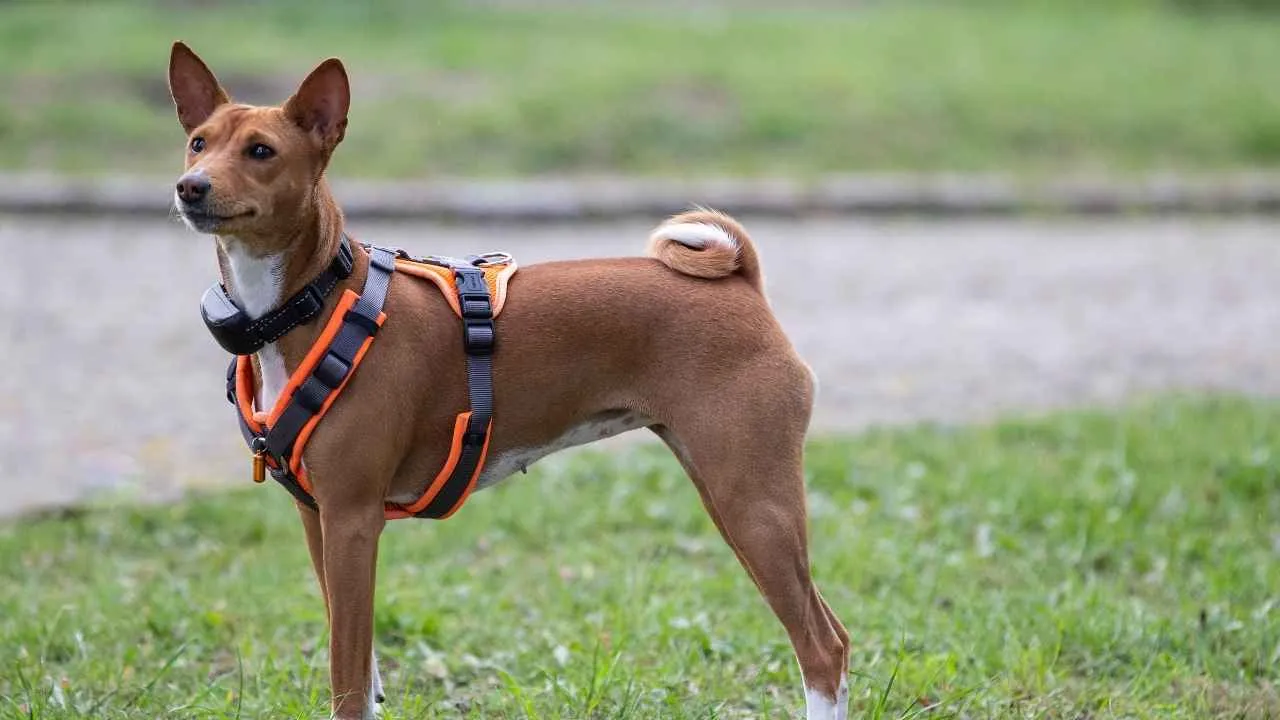
The Basenji is a unique breed from Central Africa, best known as the “barkless dog,” according to PetMD.
Instead of barking, they make a yodel-like sound called a “baroo.” But don’t let the lack of barking fool you—Basenjis are not silent or shy. They are intelligent, adventurous, and one of the most independent dog breeds.
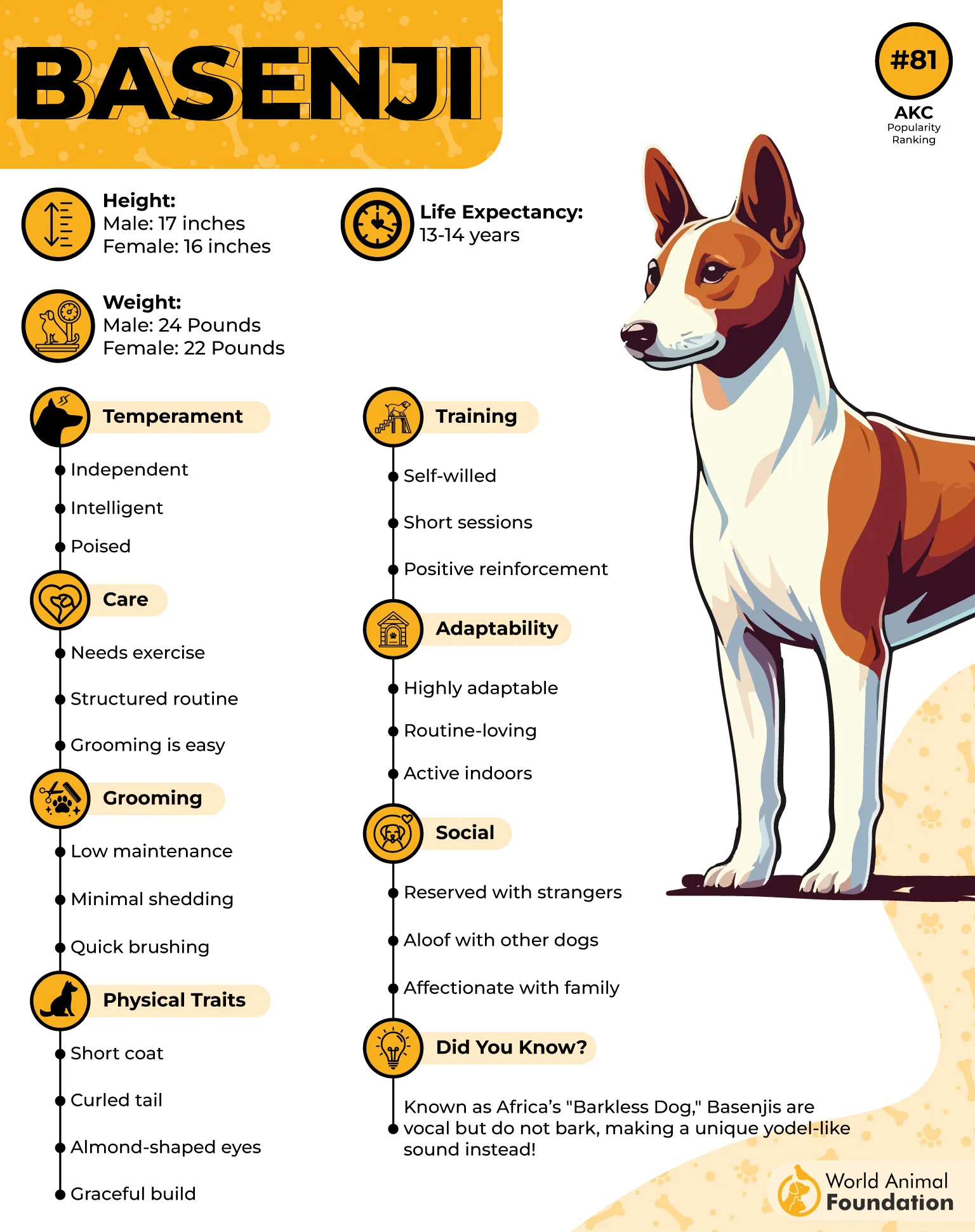
Independent but High-Energy Levels
Basenjis are not overly demanding and often act more like cats than dogs. They’re clean, curious, and enjoy exploring. While they may keep a bit of distance, they still form strong bonds with their families.
However, they are not the best choice if you’re away for long hours. Without enough activity and constant interaction, they’ll invent their own entertainment—usually involving mischief.
Smart, Stubborn, and Always Busy
Training a Basenji can be tricky. They’re smart but also have a stubborn streak, so short, fun sessions work best. They need daily exercise and proper training to stay happy. Puzzle toys, safe chew items, and securely stored food are must-haves.
Their strong prey drive means off-leash play should happen only in fenced areas. For active and patient owners, the Basenji offers a loyal companion who values independence as much as you do.
5. Akita
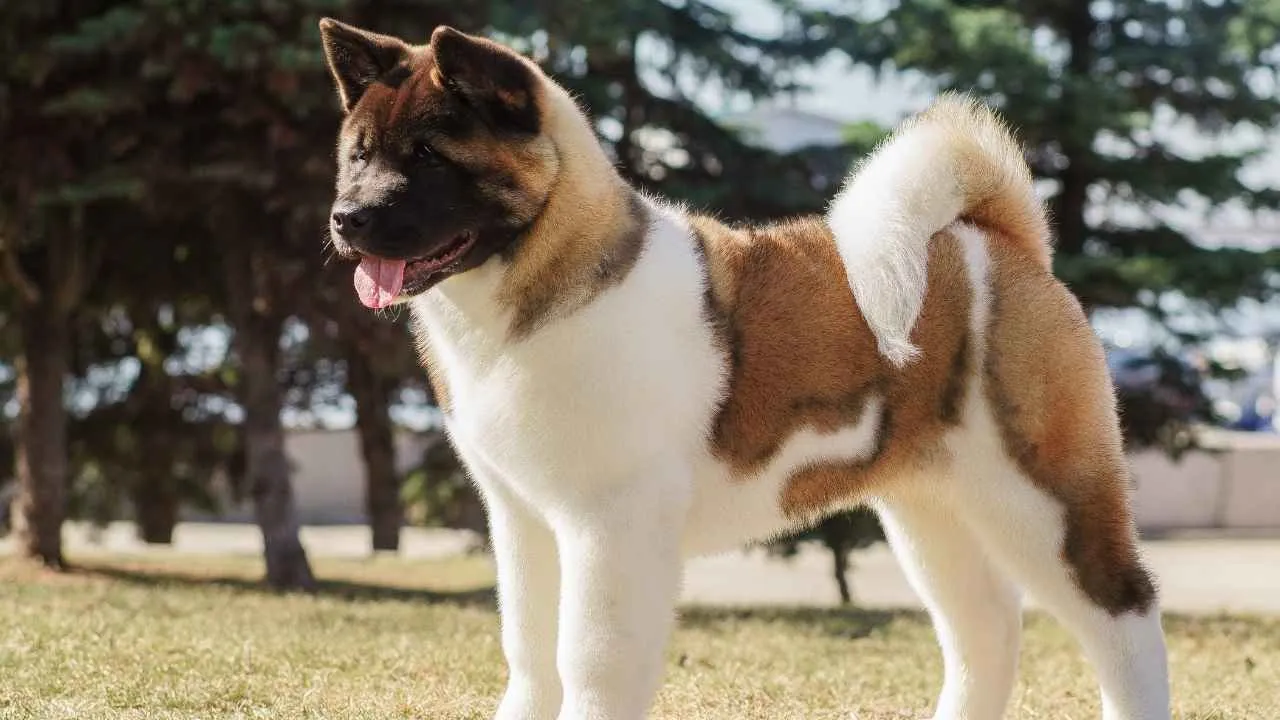
The Akita is a large, powerful breed from Japan, known for its loyalty, courage, and independence. Their calm and dignified nature sets them apart. Akitas are not needy dogs—they enjoy affection but don’t constantly seek it. They’re often described as quiet, intuitive, and highly self-sufficient.
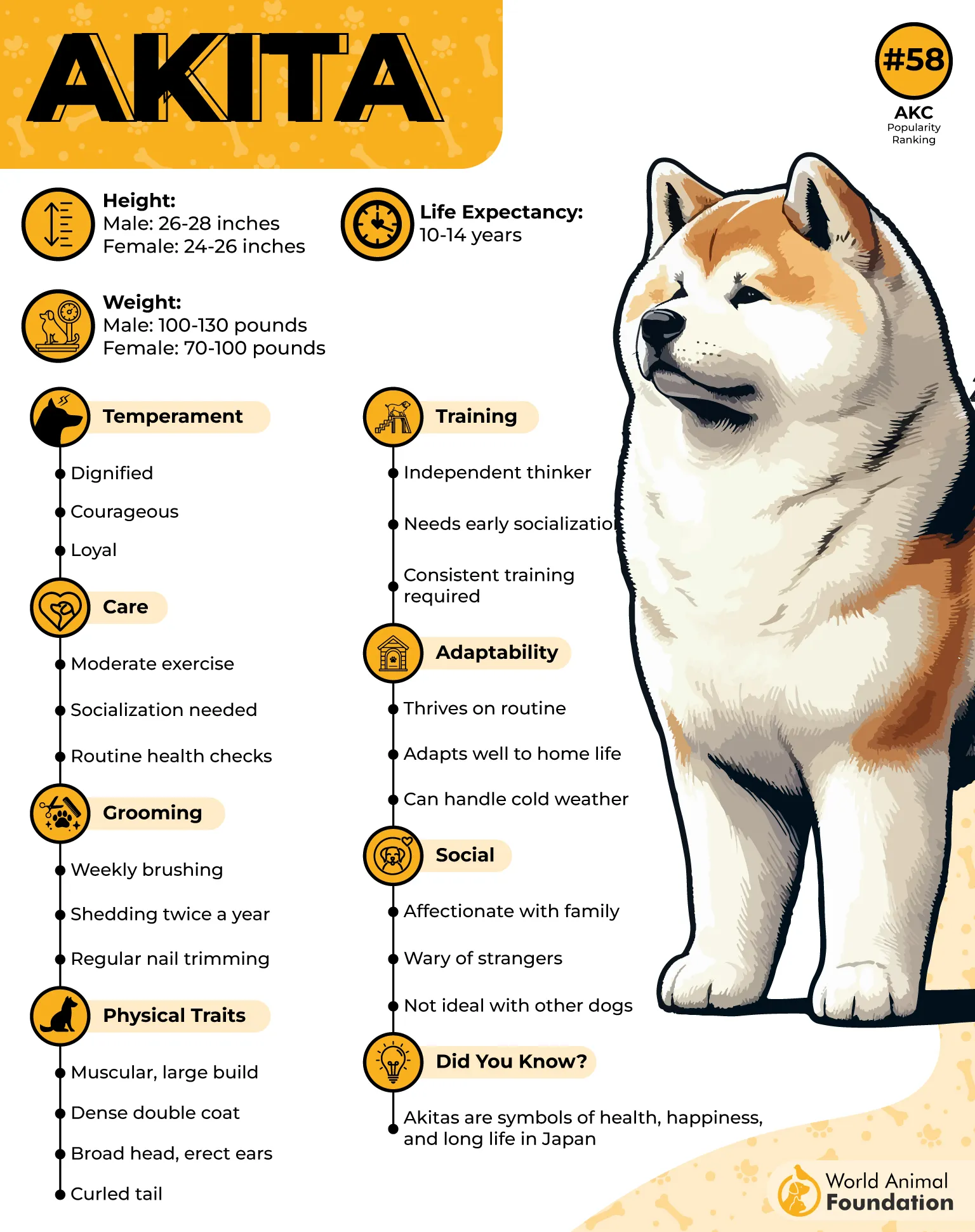
Brave, Loyal, and Reserved
Akitas form strong bonds with their families and are deeply protective. They are usually aloof with strangers, making them excellent watchdogs. Their loyalty is legendary—just think of Hachikō, the Akita who waited nearly 10 years for his owner.
However, early socialization is important. Without it, their natural protectiveness can become a challenge.
Best for Confident Owners
Because of their size and strong-willed personality, Akitas are better suited for experienced owners. They need consistent training and a leader they can trust. Though they do fine on their own for a few hours, they need structure and purpose.
With the right care, an Akita will be a steady, loyal companion who respects your space—and expects you to respect theirs.
6. Alaskan Malamute
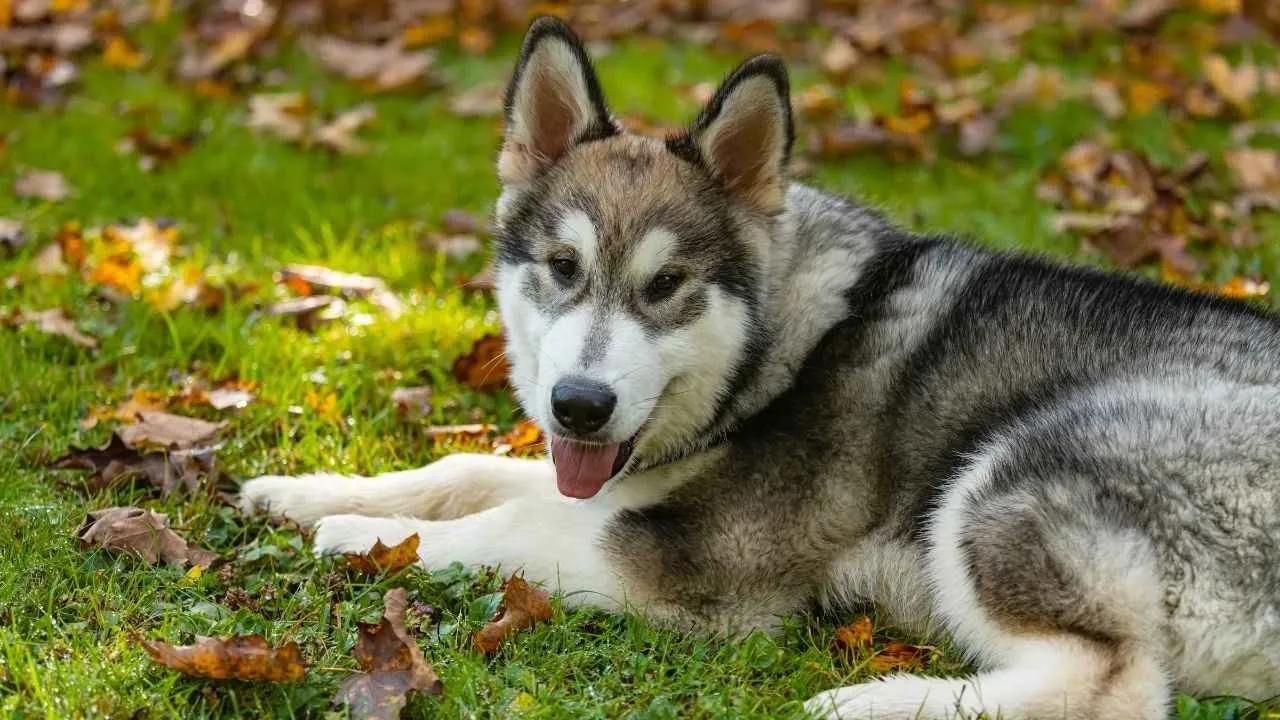
The Alaskan Malamute is an independent dog breed originally bred for sled-pulling in harsh arctic conditions.
With their thick double coat, strong build, and plumed tail, they’re built for endurance and work—not cuddling on the couch all day. Despite their size and strength, Malamutes have a peaceful, calm nature indoors.
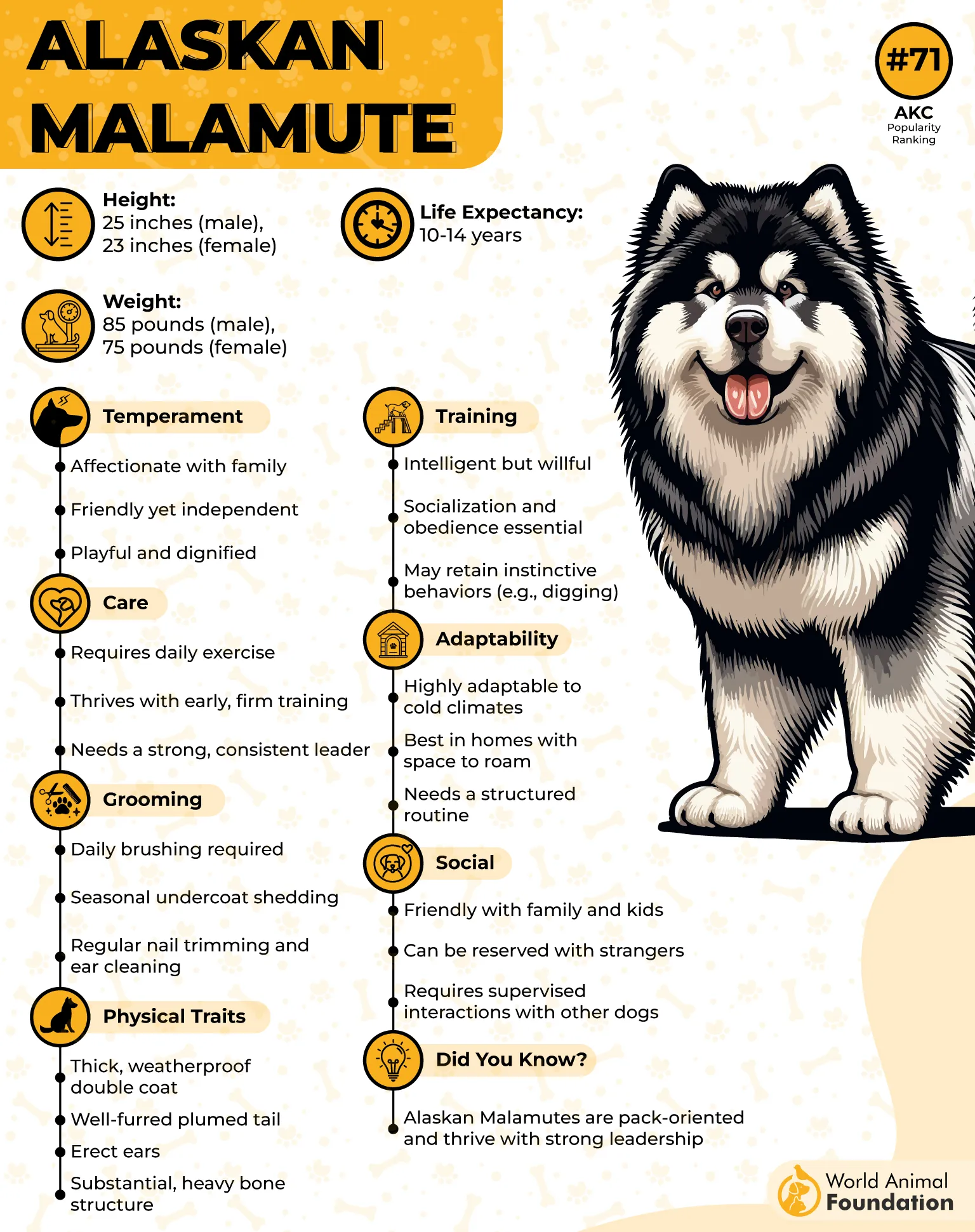
Independent and Hardworking
Malamutes are known for their independence. They don’t rely on constant human attention and usually prefer relaxing on the floor over climbing onto your lap.
These dogs are loyal to their family, but they also have a strong will and may challenge owners who aren’t firm and confident. Early training and leadership are key to raising a respectful and happy Mal.
Best with Experienced Owners
Because of their size, strength, and stubborn streak, Malamutes are best suited for experienced dog owners. They need structure, space to move, and plenty of exercise.
Though they enjoy spending time and being part of a family pack, they’re not overly clingy. For someone who wants a loyal, low-drama companion with a quiet and independent spirit, the Alaskan Malamute is a great fit.
7. Irish Wolfhound
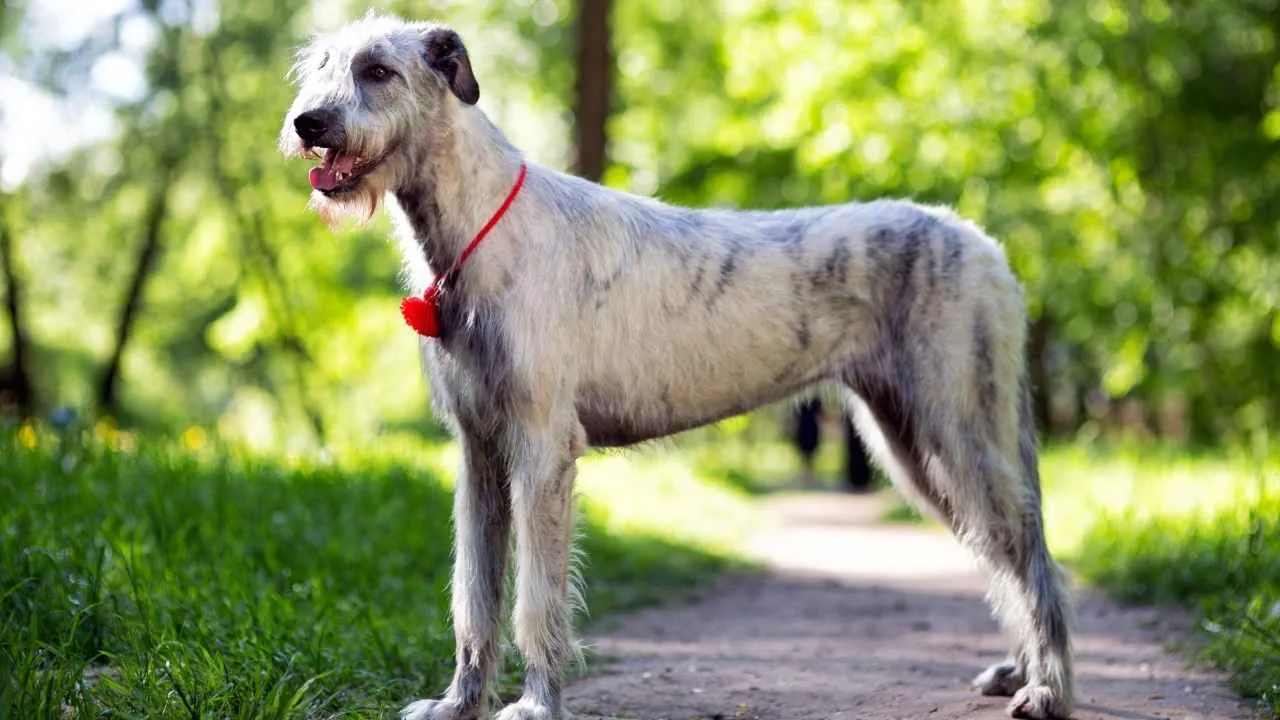
According to AKC, the Irish Wolfhound is the tallest of all dog breeds, often standing close to 3 feet tall at the shoulder. Originally bred to hunt large game like wolves, today’s Wolfhound is calm, kind, and independent.
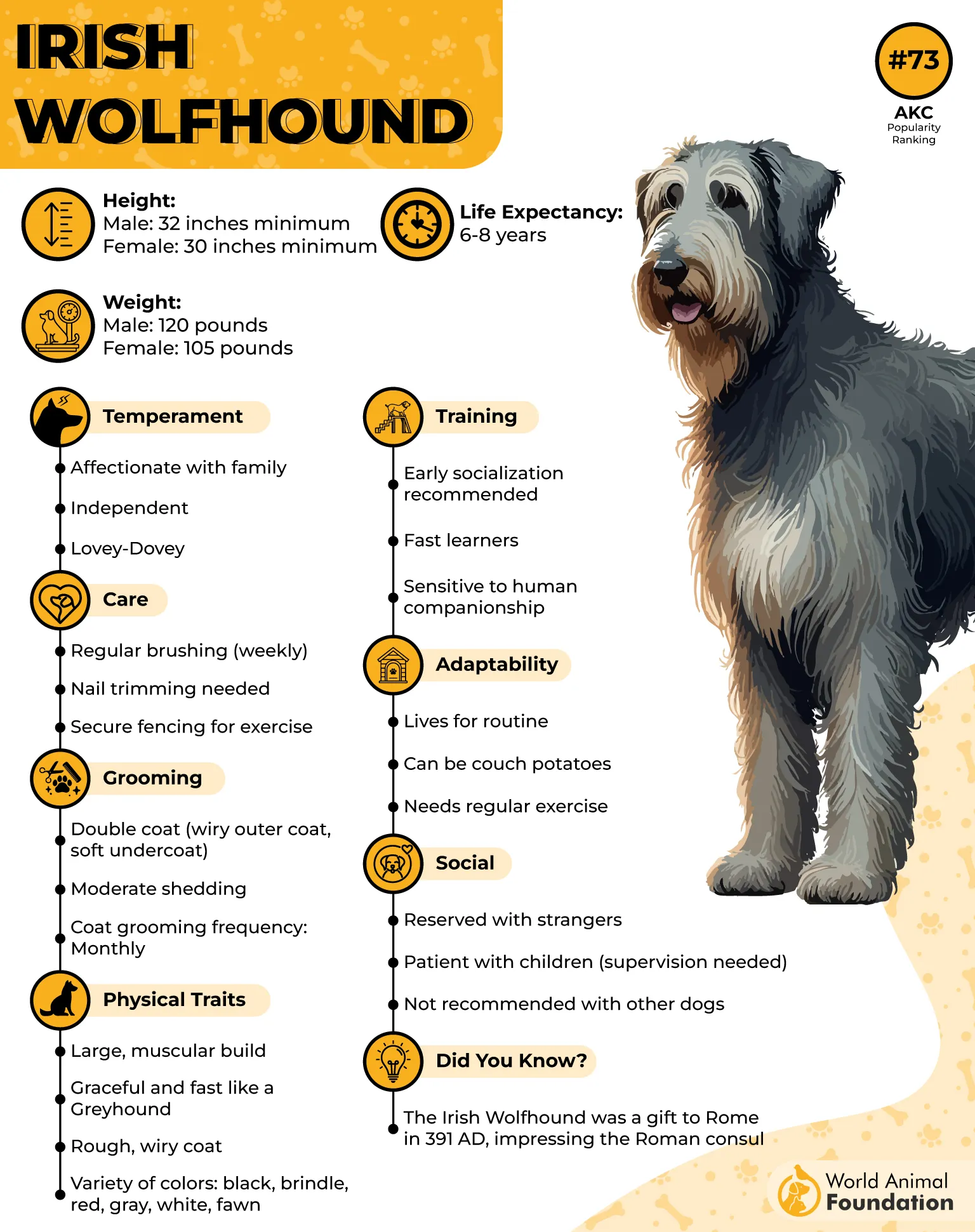
Calm and Easygoing
Despite their size, Irish Wolfhounds are not aggressive. They have a dignified, quiet nature and prefer gentle interaction.
They don’t demand constant attention and are content to relax nearby. Though friendly with family, they can be reserved with strangers. Their large size and laid-back attitude make them better suited for homes with space.
Low-Maintenance Temperament
These dogs are easygoing and adapt well to peaceful households. They need regular walks but not intense exercise.
Early socialization helps them feel comfortable in new situations. While they aren’t ideal for apartment living, Irish Wolfhounds make loyal and mellow companions for those who can handle their size—and their heart.
Conclusion
Finding the right dog isn’t just about looks or popularity—it’s about lifestyle fit. While some breeds crave constant attention and playtime, others are perfectly happy being left to their own devices for a while.
Just remember, even low-maintenance dogs need some love. They may need less attention, but they still deserve some quality social time, daily walks, and mental enrichment.
Whether you’re drawn to a low-energy breed or a playful pup that can also self-soothe, the key is setting your expectations early. Dogs thrive when their needs—both emotional and physical—are met consistently.
So if you’re bringing home one of these more independent puppies, make sure your house is a place where they feel secure and understood.
Independent breeds can entertain themselves, yes—but like all other dogs, they still need connection. Just maybe not all the time. And if you’re gone for long periods, plan to ensure your pup stays happy, healthy, and well-exercised.
Still looking for other dog breeds that are known for their independent nature? You can also check out the Greyhound, Chinese Shar Pei, Boston Terrier, Basset Hound, and Great Pyrenees.


